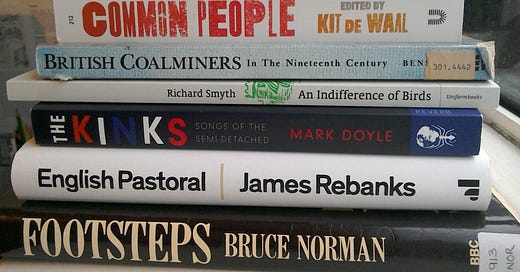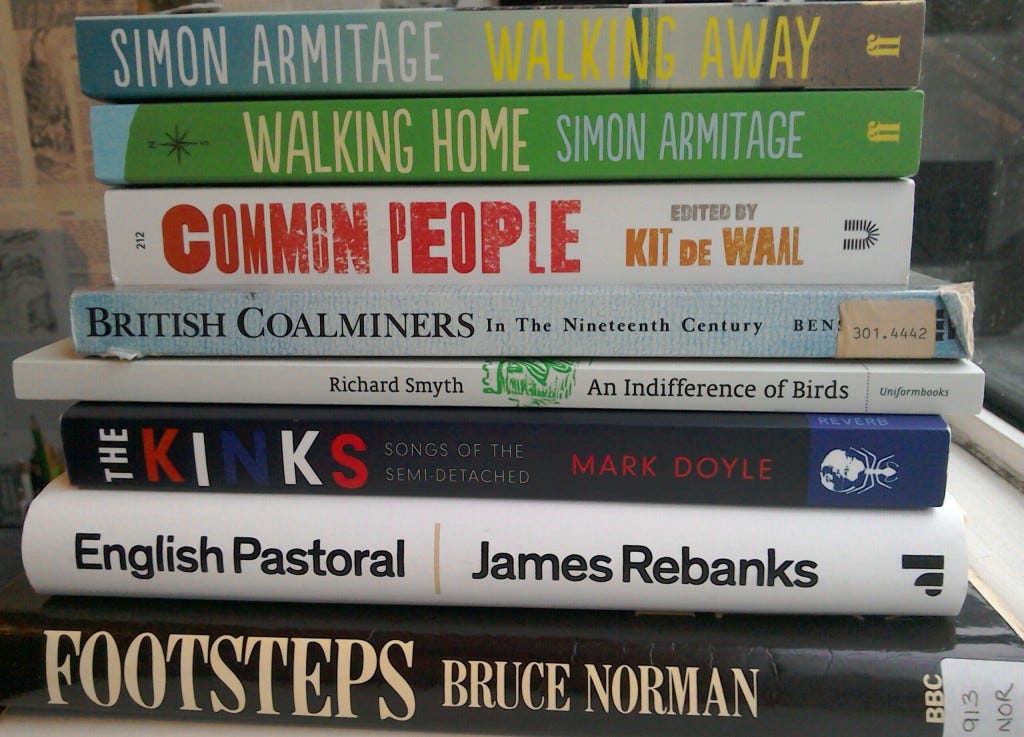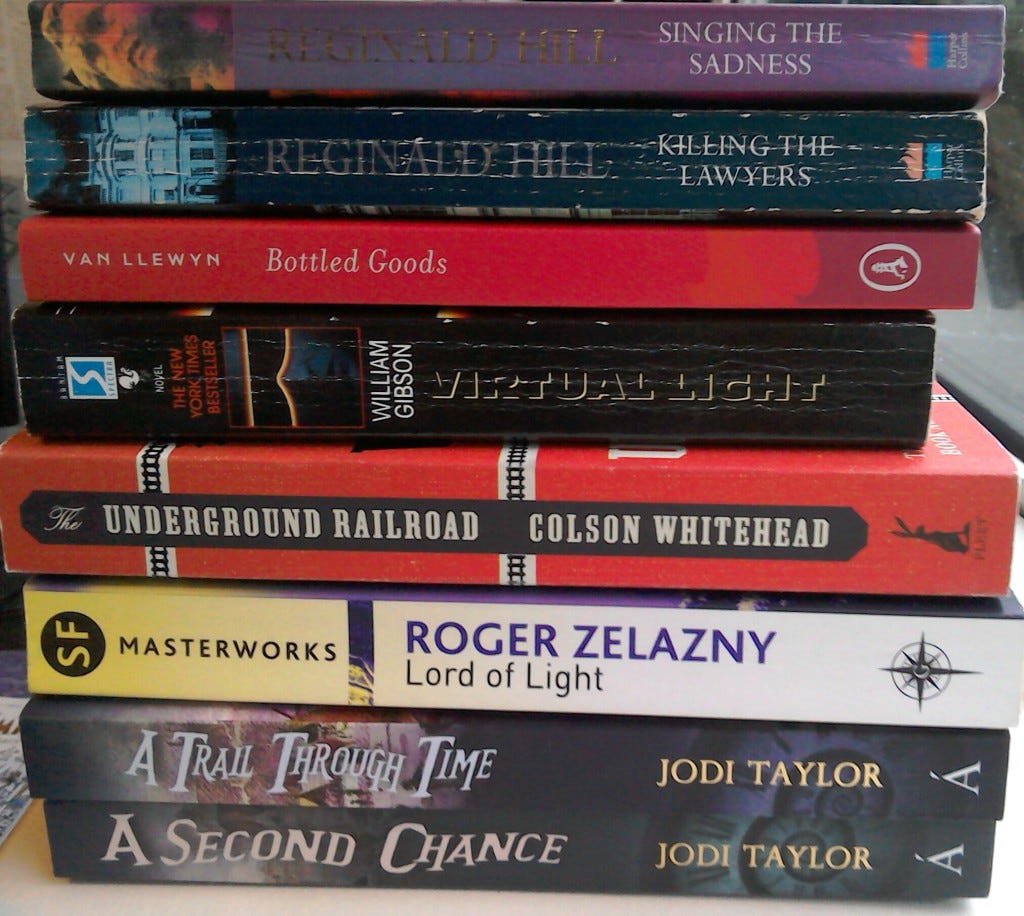2020: a year of not much reading
The traditional look back over what I read during the year just gone, as an excuse to round up the reviews I wrote, and provide a few mini-reviews of the books I didn't review at the time. I only read 20 physical books in 2020, most of which are pictured below, split into non-fiction and fiction. I also read 14 e-books and listened to 4 audiobooks, but for various reasons the audiobooks never get counted in any of my totals. I read even fewer books in 2020 than I had in 2019, and as I noted a year ago, 2019 was my joint-lowest book-tally of the decade. The proportions were broadly similar though: about two-thirds of it was fiction, just over half the fiction was sci-fi and fantasy and just over a third of it was crime. Some of it was both.
As you can see from the photo above, my non-fiction reading was pretty wide-ranging. I started with the pair of Simon Armitage books my sisters bought me for Christmas 2019. In Walking Home, Simon Armitage (now the poet laureate) walks the Pennine Way in the reverse of the usual direction, starting in Scotland and ending up near his house in West Yorkshire. It's an entertaining journey through the north, sometimes walking with friends, sometimes with strangers and sometimes alone, but each night doing a poetry reading in an attempt to pay for bed and board. Walking Away is a similar format a couple of years later, but this time he's walking in an unfamiliar part of the country, the south-west coast. I didn't enjoy Walking Away as much, partly because I got the sense that he wasn't enjoying the trip as much. He comes across as almost mourngy at times - his back hurts, his feet hurt, he's not in the mood for a reading, he's not enjoying the company of the strangers who've come to walk with him - and the book has a faintly dissatisfied air like a contractual obligation album from a band you used to like. If you've enjoyed any of his prose though, give Walking Home a go.
Common People is a collection of short memoir pieces from known and hitherto unknown writers from working-class backgrounds, several of whom I chat to now and then on Twitter, which gave it an added thrill for me. There are a variety of tales in there and I recommend it whether you think you might recognise any of the experiences in it or not. Maybe particularly if not. The Kinks book was heavily class-based too, but definitely for the Kinks fans as you need a certain level of familiarity with their early albums.
I wrote about Footsteps when I read it, and gave links to scanned-in copies of the original memoirs on archive.org, which is also where I found an excellent account of the Luddites around Cleckheaton. You might be surprised at the local history books or niche memoirs you can find there - have a nose around if you have even the slightest interest in history beyond the national level and the famous names. I also listened to the audiobook of Mudlarking by Lara Maiklem, via the library and the Borrowbox app. Lara searches the tidal Thames for historical artefacts and I found her account fascinating despite my unfamiliarity with London. I suspect I missed out on great pictures though so if you have the chance, get hold of the actual book.
I reviewed An Indifference of Birds a few months ago - highly recommended for the interested amateur birdwatcher, particularly urban-based. I haven't reviewed English Pastoral by James Rebanks because I don't know where to start but I think it should be read by every politician, everyone on the board at supermarkets, and everyone who has the luxury of choice when it comes to food (by which I mean, their first priority isn't maximum nutrition per pound due to their tiny food budget). James Rebanks is a Cumbrian farmer and in this book full of love and a sense of responsibility, he looks back at the way his grandfather farmed, where it all went wrong in his father's generation, and how James and his children might be able to start putting things right. It talks about soil health and the downward spiral of artificial fertilisers, but also about the land and the wildlife, and it's written beautifully. In a similar vein but with a different focus is Wilding by Isabella Tree, which OneMonkey and I listened to (again via the library). I started out bristling at these entitled aristocrats but it is a fascinating account of switching from intensive farming to a system that's more in tune with nature, and I learnt a lot about counterproductive government incentives for agriculture.
Now to fiction. I did read a few physical books, as shown in the photo above. Mainly they were second-hand copies that were already on the To Read shelf when lockdown hit, a couple were ordered via Hive (which supports independent bookshops) or the Waterstones site. Mostly, however, I read e-books: a couple via the library and Borrowbox, some direct from small publishers, several from Kobo (since I have a Kobo mini), and one out-of-copyright downloaded for free.
I did an SFF round-up in the summer, gave a quick recommendation of Diary of a Somebody by Brian Bilston, and individually reviewed The Imaginary Corpse by Tyler Hayes and Big Sky by Kate Atkinson. Big Sky was the fifth in a series where I'd read the preceding four, and there were a few similar continuations during the year (by Tad Williams, Reginald Hill, Georges Simenon, CJ Sansom, Vic James, Jodi Taylor) so I don't think I have any more reviews to give. I will, however, mention the audiobook of Early Riser by Jasper Fforde. A standalone novel, this is set in an alternative Wales where Tom Jones is still known for Delilah, but most humans hibernate every winter to avoid the arctic conditions. Nothing is quite as it seems, and poor Charlie Worthing's about to get caught up in a winter nobody wants to experience, least of all him. The level of detailed imaginative brilliance was breathtaking but the reading by Thomas Hunt gave it an extra dimension and I'm glad I listened to the audiobook from the library (so we could both 'read' it at once) rather than read the book.
I've already read two books in 2021, reviews to follow shortly, but if I just helped you find your next book to read you can always buy me a cuppa…






